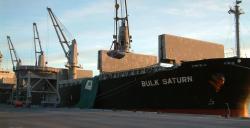Ever since the Moroccan invasion in 1975, Western Sahara has suffered tremendous hardship under the rule of its northern-bordering neighbor. Despite international opinion demanding sovereignty for Western Sahara, the territory today still remains occupied. The Norwegian authorities have, among others, repeatedly dissuaded Norwegian companies against doing business with the occupying power. According to Norwatch, this policy has now failed (27-JUN-07)
Based on the information published by Norwatch, this article has been prepared by Øystein Jotheim and published by Gunta Venge at the Rafto Human Rights House Bergen.  The conclusion made by the news agency is based on recent revelations of considerable transport of phosphate, performed by a Norwegian-based shipping company. The company in question is Gearbulk; its shares owned 60 % by the Jebsen-family in Bergen, Norway. The ethical dilemma of this trade arises, as the resources being exported, reportedly to harbors in New Zealand, are expropriated from Western-Saharan territory. Nonetheless, the country’s people, the Saharawis, do not benefit at all from the ongoing business. The profiteers are namely Moroccan authorities and, in this case, Norwegian shipping owners. “The Norwegian company is transporting stolen goods,” says the Saharawi human rights activist, Sidi Mohammed Daddach.
The conclusion made by the news agency is based on recent revelations of considerable transport of phosphate, performed by a Norwegian-based shipping company. The company in question is Gearbulk; its shares owned 60 % by the Jebsen-family in Bergen, Norway. The ethical dilemma of this trade arises, as the resources being exported, reportedly to harbors in New Zealand, are expropriated from Western-Saharan territory. Nonetheless, the country’s people, the Saharawis, do not benefit at all from the ongoing business. The profiteers are namely Moroccan authorities and, in this case, Norwegian shipping owners. “The Norwegian company is transporting stolen goods,” says the Saharawi human rights activist, Sidi Mohammed Daddach.
 Mr. Daddach (left) has also previously experienced Norwegian entrepreneurial behavior. He received international attention in 2002, as he was awarded the Rafto Prize in Bergen for his efforts to obtain human rights and freedom for his people. However, his speech of thanks at this event was charged with discontent with Norwegian oil companies; a disappointment he now repeats, though pertaining to a different industry. ”After Norway ceased searching for oil off the coast of Western Sahara, I thought it meant the end to their looting of Saharawi resources.” Mr. Daddach now urges Norwegian authorities to direct its attention to this case immediately, and force the Jebsen-family to put an end to its commercial indulgence in unethical trade. Sidi Mohammed Daddach is surprised that the Norwegian government has not yet passed legislation on this area, hinting that a prohibition by law would prevent such trade from flourishing.
Mr. Daddach (left) has also previously experienced Norwegian entrepreneurial behavior. He received international attention in 2002, as he was awarded the Rafto Prize in Bergen for his efforts to obtain human rights and freedom for his people. However, his speech of thanks at this event was charged with discontent with Norwegian oil companies; a disappointment he now repeats, though pertaining to a different industry. ”After Norway ceased searching for oil off the coast of Western Sahara, I thought it meant the end to their looting of Saharawi resources.” Mr. Daddach now urges Norwegian authorities to direct its attention to this case immediately, and force the Jebsen-family to put an end to its commercial indulgence in unethical trade. Sidi Mohammed Daddach is surprised that the Norwegian government has not yet passed legislation on this area, hinting that a prohibition by law would prevent such trade from flourishing.
 The chairman of the Board of the Rafto Foundation, Arne L. Lynngård (left), shares Mr. Daddach’s views of the situation as totally unacceptable. “It is highly problematic, both ethically and politically, that a Norwegian shipping company engages in such matters” he claims. “Morocco finances the occupation of Western-Sahara through the exploitation of these resources”. There is little doubt that a continuation of this activity will only cause more harm to the Saharawis. As of now, more than half of the Saharawi population, estimated to about 340 000 people are settled in refugee camps in neighboring Algeria. Freedom of speech is severely limited, and a recently planned demonstration against the Moroccan occupation was intercepted before it got started. When it comes to the phosphate industry, it has been reckoned that only 200 of today’s 2000 employees in the business are native Saharawis – in 1968, they amounted to a numerous 1600 workers.
The chairman of the Board of the Rafto Foundation, Arne L. Lynngård (left), shares Mr. Daddach’s views of the situation as totally unacceptable. “It is highly problematic, both ethically and politically, that a Norwegian shipping company engages in such matters” he claims. “Morocco finances the occupation of Western-Sahara through the exploitation of these resources”. There is little doubt that a continuation of this activity will only cause more harm to the Saharawis. As of now, more than half of the Saharawi population, estimated to about 340 000 people are settled in refugee camps in neighboring Algeria. Freedom of speech is severely limited, and a recently planned demonstration against the Moroccan occupation was intercepted before it got started. When it comes to the phosphate industry, it has been reckoned that only 200 of today’s 2000 employees in the business are native Saharawis – in 1968, they amounted to a numerous 1600 workers.
The Jebsen-group has so far not made any statement in response to Norwatch’s discoveries. Avoiding the issue will, however, contribute to nothing but the debilitation of the company’s reputation. Having neglected ethical guidelines, the company, and in the end the Norwegian government, must now find a way out of this quagmire. Not for the sake of maintaining a reputable façade in the face of international scrutiny, but for the future of Western Sahara. Obtaining from unfair trade for the benefit of justice and freedom for the Saharawis, should, and must be an absolute and unreserved demand.





